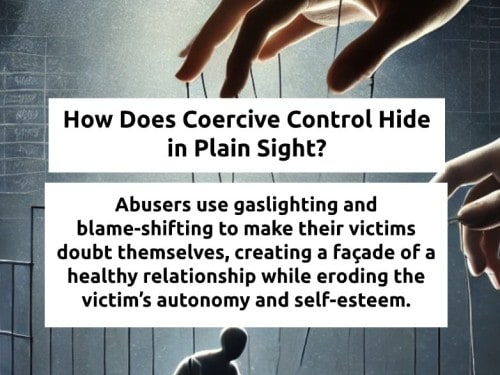Recognising Coercive Control

posted 24th January 2025
Coercive Control: Recognising the Warning Signs and Protecting Yourself
Coercive control is a form of psychological abuse where one person manipulates and dominates another to gain power and control. This often subtle yet insidious behaviour can occur in romantic relationships, friendships, and even family dynamics. Understanding what coercive control is and recognising its warning signs are critical for maintaining healthy relationships and protecting personal boundaries.
What is Coercive Control?
According to the UK Domestic Abuse Act 2021, coercive control is defined as a pattern of behaviour or acts designed to harm, punish, or frighten a person. It can include manipulation, isolation, financial control, and emotional abuse. Unlike physical violence, coercive control often leaves no visible scars, making it harder to identify but equally damaging.
Psychologists frequently see patients who have been led to believe they are abusers, only to uncover that they have been subjected to psychological abuse themselves. Coercive control is especially harmful when the abuser weaponises mental health diagnoses, finances, or other vulnerabilities to gain dominance.
Warning Signs of Coercive Control and Manipulation
Checklist for Recognising Coercive Control
Financial Coercion
Demanding access to bank accounts, credit cards, or other financial assets.
Accusations of financial manipulation when boundaries are enforced.
Pressuring someone to pay all bills or fund lavish expenses.
Rapid Escalation of Commitment
Insisting on moving in together quickly.
- Talking about marriage or children early to create a sense of obligation.
- Isolation from Support Networks
Discouraging or preventing contact with family and friends.
- Monitoring correspondence or phone calls.
- Emotional Manipulation
Gaslighting (making the victim question their reality or sanity).
- Accusing the victim of being abusive or manipulative to deflect blame.
- Exploitation of Vulnerabilities
Using the victim's mental health struggles (e.g., accusing them of being borderline personality disorder to invalidate their concerns).
- Exploiting shared addictions, such as mutual alcohol dependency, to exert control.
- Invasive Behaviour
Reading personal correspondence or emails without permission.
- Contacting ex-partners to gather "evidence" to use against the victim.
Red Flags: When Someone May Be After Your Money
Financial manipulation is a common tool in coercive control. Some red flags to look out for include:
1. Early Demands for Financial Access: If someone you’re dating quickly begins asking for access to your bank account, credit cards, or financial information, this is a significant warning sign.
2. Accusations of Financial Abuse: They might accuse you of being controlling with money to guilt you into sharing finances.
3. Pressure to Marry or Commit: Using promises of future children or emotional ultimatums to push for marriage or financial entanglements.
4. Frequent "Emergencies": Constantly needing money for unexpected expenses and framing it as your responsibility to help.
5. Living Beyond Their Means: Insisting on expensive outings or a lifestyle they cannot afford, expecting you to cover costs.
Why Do We Stay in Coercive Relationships
Despite recognising the warning signs, many individuals remain in toxic, coercive relationships for a variety of reasons:
Shame: They feel embarrassed to admit they are being exploited,
Fear of Being Alone: Emotional dependence and fear of starting over can make it difficult to leave.
Addiction to Drama: The cycle of highs and lows in the relationship may create an unhealthy attachment.
Confusion and Gaslighting: Persistent manipulation makes them question their own perceptions and whether they are at fault.
Exploitation of Mental Health and Addiction
Abusers may use their partner’s mental health struggles or addictions to tighten their control. For example:
Weaponising Diagnoses: Labelling their partner as having a mental health disorder, such as borderline personality disorder (BPD), to discredit their concerns.
Shared Addictions: In relationships with mutual alcohol dependency, one partner may use the addiction as leverage to guilt or manipulate the other, suggesting they "need" their partner to stay sober.
How to Protect Yourself and Seek Help
If you suspect you are in a coercive relationship, taking proactive steps can help:
Document Everything: Keep records of abusive behaviour, including financial demands and correspondence.
Set Boundaries: Clearly define what you are comfortable sharing or compromising on, especially regarding finances.
Consult a Psychologist or Therapist: Professional help can clarify your situation and help you build emotional resilience.
Talk to Trusted Friends or Family: Don’t let isolation deepen. Share your concerns with someone you trust.
Know the Law: In the UK, coercive control is a criminal offence. Seek advice if you feel you are being manipulated or abused.
Why Therapy is Essential
Therapy is invaluable for recognising coercive control and breaking free from it. For those who feel trapped in such relationships, regular therapy can:
1. Provide tools to rebuild self-esteem and emotional awareness.
2. Help develop a broader array of emotional experiences, reducing reliance on manipulative dynamics.
3. Address the guilt or shame that may prevent them from leaving.
At our clinic, we’ve worked with patients who initially believed they were abusers, only to discover they had been subjected to psychological abuse. Through therapy and experiential exercises, such as guided journaling and mindfulness, they developed greater self-awareness and emotional clarity.
Coercive control can be difficult to identify, particularly when the abuser weaponises finances, mental health diagnoses, or shared vulnerabilities like addiction. Recognising the warning signs and seeking help is critical. If you or someone you know is in a coercive relationship, don’t hesitate to reach out to a trusted psychologist or helpline. Emotional freedom and safety are possible with the right support.



